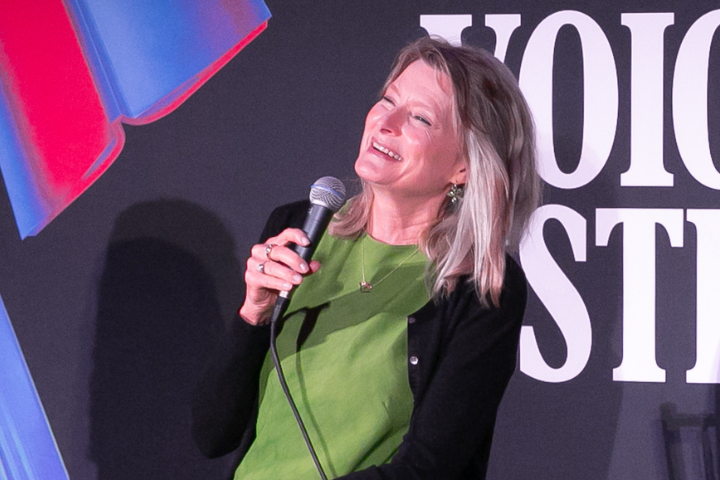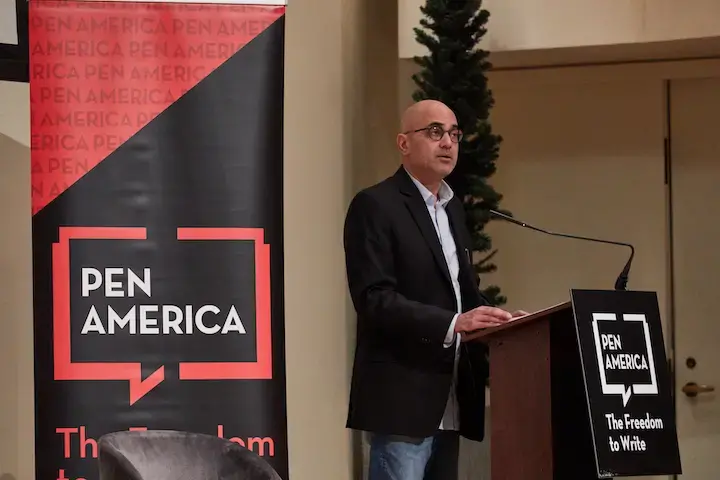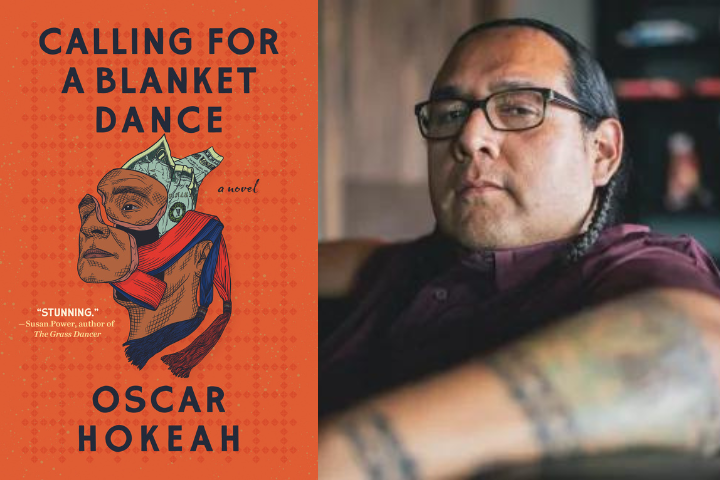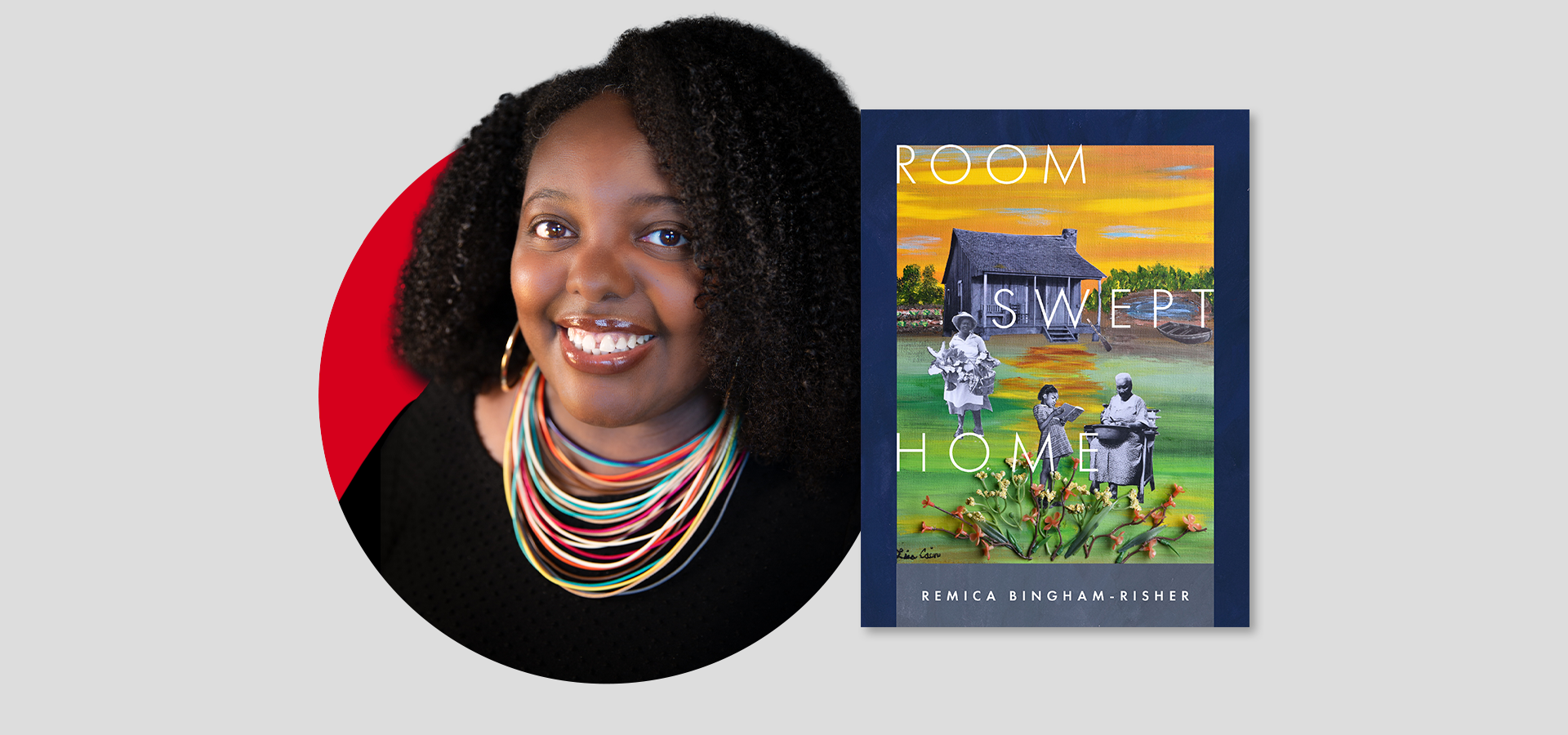
Remica Bingham-Risher | The PEN Ten Interview
February 21, 2024
In her fourth collection of poems, Room Swept Home (Wesleyan, 2024), Remica Bingham-Risher breaks open the space between family lineage and public history. The book explores how two of the poet’s ancestors intersect forty years before she is born: in 1937, her paternal great-great-great grandmother is interviewed for the Works Progress Administration Slave Narratives in Petersburg, Virginia, where her maternal grandmother is sent in 1941 for what we now understand as postpartum depression. Using archival material, medical records, interviews, and photography, Bingham-Risher crafts a woman-led narrative that looks beyond what has been documented about Black Southern women to instead ask what they have witnessed.
In this interview with Malcolm Tariq, Senior Editorial Manager for PEN America’s Prison and Justice Writing Program, Bingham-Risher talks about growing as a writer, the challenges of working with family history, and the uses of poetry in telling a story. (Bookshop)
1. When did you know you were writing the book that would become Room Swept Home? What inspired you to put the lives of these two women in conversation with one another?
I probably realized I was writing Room Swept Home about 10 years ago. That’s how old the title poem in the book is, and I knew then I was thinking on my grandmothers, how our lives intersected, and the hopes and dreams they might’ve had for us. When I found that Minnie and Mary, my two grandmothers, had been within one mile of each other in 1941, due to extraordinary circumstances and unbeknownst to themselves, well, that was just too much for me to bear as a poet, so I knew I had to write their stories and ours.
2. Room Swept Home is centered on two personal stories that are contextualized by historical events and themes. How did you think about matters of “public” and “private” in the making of this book? Did boundaries around either influence the shape of the project?
That’s a good question. In the beginning, I was thinking much about their “private” lives, their inner lives, who they were outside of the “public” gaze. Of course, when you begin writing these very personal stories, and trying to bring family history to light, you do it in the context of the various “public” historical events that are happening all around those you are examining. Eventually, that intersection of “public” and “private” becomes inevitable, and I decided to lean into this inevitability, and write a kind of alternate Black American history with context as well.
“The idea of generating titles from different sources has been something I’ve been leaning into since my first book. Often, the spark of a poem is created by something I’ve read or heard, and usually the source has said it well enough that I’m creating another layer of meaning by starting at that pinpoint.“
3. I really appreciate how much of a reading experience this book is. Arriving at the notes section after my first read, I learned about the many sources that inspired the titles of the poems. This added a rich layer of not only meaning but also vocality when I revisited the narrative. How did you come to this idea of generating titles from primary and secondary sources?
Well, first, thank you for reading it, and reading it again; that’s the kind of attention poets dream about for their books :-). The notes have always been a really important part of the text for me. I am a writer and reader, who loves ephemera, layering, vocality as you pointed out, in song, and in the coupling of like-minded voices. The idea of generating titles from different sources has been something I’ve been leaning into since my first book. Often, the spark of a poem is created by something I’ve read or heard, and usually the source has said it well enough that I’m creating another layer of meaning by starting at that pinpoint. This melding is something I love encountering as a reader, so it’s a technique I love employing as a writer as well.
4. If you faced any challenges writing this book, how did you overcome them? Or, if you rather, what breakthrough moments did you experience as you were writing these individual and collective histories?
They were many challenges, some of them being the psychic and emotional weight of delving into history, especially history I couldn’t separate myself from even if I wanted to. I had to wait a long time to write this book. We had to wait 75 years to get my grandmother Mary’s records from Central State Hospital (formally the Central Lunatic Asylum for the Colored Insane), so I couldn’t really begin writing in earnest until 2016 when I could access those records. Some of the breakthrough moments came when I decided I would be reckoning not only with my ancestress’s trauma, but also their joy, and how they raised us to understand that you can overcome nearly anything in your journey. I don’t think I’ve ever cried as much writing and revising poems as I did with the work in Room Swept Home. Some days it was so close to the surface that I almost felt full to bursting and had to put the book aside. I know these women are living in me, and I felt them more deeply—more than I thought I could—while making my way through this work. I also had to reckon with much that we tamp down living in this country. We all know how difficult it can be to scrutinize the lineages of race, supremacy, privilege, agency, sexism, colorism, heartache, disparities, and all we’re left here to fight our way through, despite our own best intentions in the present.
“As a book makes its way into the world, you learn daily about it, about yourself, mostly by what the readers are taking from it. I hope people find some joy in it. I hope they realize that stories that were often swept under the rug can mean much to us in the hereafter, can teach us about our own survival and thriving and desire.“
5. You have extensive experience writing and publishing in both poetry and nonfiction. In fact, your most recent nonfiction title, Soul Culture: Black Poets, Books, and Questions that Grew Me Up (Beacon Press, 2022), explores a dynamic cadre of literary ancestors and other creative and cultural engineers that have influenced your artistry. Why poetry to tell the story presented in Room Swept Home?
Poetry allowed me to tell the story in as many different ways as I wanted to. I employ lots of formal verse; I’m able to move between persona and the personal. But Room Swept Home is really a hybrid text in many ways. It does open with an essay, and then a family tree, created by two Black women artists and graphic designers. There are poems but they are also historical and family photographs. There’s a full bibliography, and as you’ve already pointed out, a robust Notes section along with Acknowledgements that begin with a laundry list of librarians and archivists who helped bring the work to light. Not to mention the art that was created by Lisa Cain, yet another Black woman collaborator who thought deeply about Minne, Mary and me, while creating her piece entitled “Generational Wealth” that graces the cover. This book was a labor of love and intention with so many moving pieces. For me—no matter what else I write—I’m a poet first. And poetry, in many ways, is our vehicle that does it best. It tells the story in myriad ways, and frees us to examine experience and imagination in equal measure.
6. Room Swept Home is your fourth collection of poetry and your fifth published book overall. In what ways has your relationship to writing changed over time?
I’ve become more comfortable as a writer. I’m less afraid each time that the words won’t come back. This was a real fear probably up until book three, so if there are any writers out there reading this, know that we’re all experiencing the same things! But I’ve found that as long as I’m reading—filling the well, as it were—the words come back. After all these years, I also understand that writing can be as expansive as we let it be. That’s what I’m focusing on now, not limiting myself, and writing the things I dream of, as they are the things that continue moving me. Room Swept Home is still teaching me, so I’m not sure yet what the greatest lesson is.
7. What is the greatest lesson writing this book taught you? What are your hopes for how Room Swept Home sits with readers?
Room Swept Home is still teaching me, so I’m not sure yet what the greatest lesson will be. As a book makes its way into the world, you learn daily about it, about yourself, mostly by what the readers are taking from it. I hope people find some joy in it. I hope they realize that stories that were often swept under the rug can mean much to us in the hereafter, can teach us about our own survival and thriving and desire. I hope they know they can do whatever the heck they want to as they’re writing, creating. I hope it’s freeing some folks, like it’s freeing me.
8. If Room Swept Home were best friends with two other books, what would they be and why?
Wow, this is a hard question, a good one though. If I think expansively about this, then maybe Lalita Tademy’s Cane River, it’s a historical fiction, but based on decades of family research and history. Another friend would be Nikky Finney’s Love Child’s Hotbed of Occasional Poetry: Poems & Artifacts, a hodgepodge of poems, love notes and personal threading of a singular experience linked to history and ancestry. I know you only asked for two but, as an aside, I’ve seen several readers link Room Swept Home to Honorée Fanonne Jeffers’s The Love Songs of W.E.B. Du Bois, which I think is apropos not only because of the content of both, but because Honorée is a dear mentor/friend and we rode with each other through these books’ entire journeys.
“Some of the breakthrough moments came when I decided I would be reckoning not only with my ancestress’s trauma, but also their joy, and how they raised us to understand that you can overcome nearly anything in your journey. I don’t think I’ve ever cried as much writing and revising poems as I did with the work in Room Swept Home.“
9. What other writers are you currently reading or plan to read soon?
There are always so many books on my TBR list! This week I’ve started Kiley Reid’s Come and Get It; I’ve been excited about that book for a long while. Another longtime friend of mine, DéLana Dameron released her first novel, Redwood Court, on the same day as Room Swept Home, so she’s next up on my nightstand. I just got my hands on Orders of Service by Willie Lee Kinard III and, I don’t know the poet personally, but my God the book is so beautiful, so aesthetically pleasing, and I’ve heard nothing but wonderful things about the poet’s work, so I’m digging into that next. Also, I’m looking forward to reading Last on His Feet, by Adrian Matejka and artist Youssef Daoudi, about Jack Johnson. It’s a graphic novel/poetry text, certainly a hybrid, and that excites me.
10. Thinking back to the writer you were before your first book was published: what’s something you know now that you wish you knew then?
I wish I knew how long this community could care for you. Poets are really some of the kindest, most patient, “care/full” as Lucille Clifton would’ve said it, and considerate human beings, that it would be okay to make my way among them again and again. I would’ve also liked to know then that there were plenty of Black poets writing—contemporary Black poets—who would bolster me. I’m so grateful to be among them now. I’m so fortunate to have a means to tell all these hidden and forgotten stories.
Remica Bingham-Risher, a native of Phoenix, Arizona, is a Cave Canem fellow and Affrilachian Poet. Her work has been published in The New York Times, The Writer’s Chronicle, Callaloo and Essence. She is the author of Conversion (Lotus, 2006) winner of the Naomi Long Madgett Poetry Award, What We Ask of Flesh (Etruscan, 2013) shortlisted for the Hurston/Wright Legacy Award and Starlight & Error (Diode, 2017) winner of the Diode Editions Book Award and finalist for the Library of Virginia Book Award. Her memoir, Soul Culture: Black Poets, Books and Questions That Grew Me Up, was published by Beacon Press (2022). Her newest book, Room Swept Home, is a work of poems, historical and family photographs (Wesleyan University Press, 2024). She is the Director of Quality Enhancement Plan Initiatives at Old Dominion University in Norfolk, VA, where she resides with her husband and children.
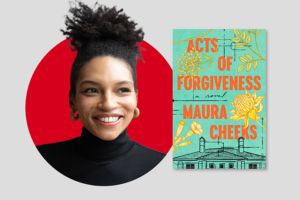
Maura Cheeks | The PEN Ten Interview
I was thinking about what would have to be true for someone in power to take a stand for reparations and push it through.

Kacen Callender | The PEN Ten Interview
I wanted to offer the idea that power is naturally inside of all of us, and that we can feel empowered and worthy and loved even when rejected by others for not meeting their criteria of worth.
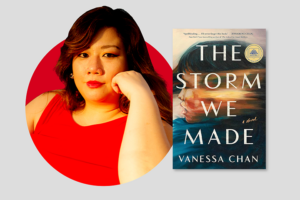
Vanessa Chan | The PEN Ten Interview
I don’t believe you can go through a publishing journey alone, especially as a writer of color.

Andrés N. Ordorica | The PEN Ten Interview
Guarding generational stories and wisdom is important especially when so many stories are now being policed.

